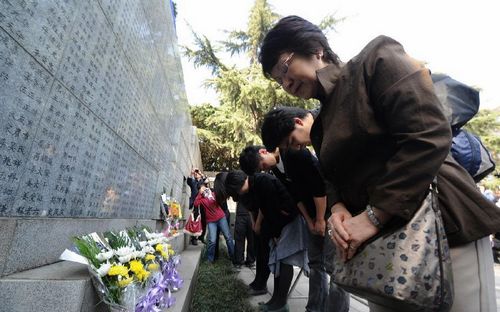National memorial days are for victory, not for hatred
- By Chen Yan
 0 Comment(s)
0 Comment(s) Print
Print E-mail China.org.cn, February 28, 2014
E-mail China.org.cn, February 28, 2014
China's legislative body has ratified a proposal to establish Sept. 3 as a day of commemoration for China's victory in the war against Japanese invasion and Dec. 13 as a memorial day for the more than 300,000 Chinese killed by Japanese troops during the 1937 Nanjing Massacre. This is not only a nationwide tribute, it is also of global significance.
|
|
|
Tamaki Matsuoka (Front), head of the Japanese left-wing group Mei Shin Kai and Japanese students of Nanjing University mourn in front of the "wailing wall", on which 10,311 names of the Nanjing Massacre victims are engraved, during a memorial ceremony at the Memorial Hall of the Compatriots Murdered in the Nanjing Massacre in Nanjing, capital of east China's Jiangsu Province, April, 4, 2012. [Xinhua/Han Yuqing] |
Painful memories are a part of history
Japan emerged as a modernized nation in the early twentieth century after the Meiji Restoration and soon became militarized, following its economic growth. Unlike the developed industrial countries in the West, the emerging Japan was much more aggressive and ruthless.
Japan captured the then Chinese capital Nanjing on Dec. 13, 1937 and started a six-week-long massacre. From the records of Japanese veterans and historical files released by the media after the war, hundreds of thousands of Chinese were killed by Japanese soldiers using extremely savage means. This massacre has been called the "blackest page in the history of modern civilization."
It was not the first massacre launched by the Japanese troops following an invasion, and nor was it the last. After the Lyushun Massacre in China on Nov. 21, 1894, Japanese soldiers also committed massacres in Manila in 1941 and in Singapore in 1942.
The Auschwitz concentration camp in Poland is a painful memory in modern history. But there has not so far been a national memorial day for the Chinese people who sacrificed themselves in the Anti-Japanese war and World War II to help them remember the pains and brutality of war and pray for lasting peace. Now China's decision will give the world an answer. If people do not remember the pains of history, they cannot prevent pain in the future.
Victory over evil is worth commemorating
Before the outbreak of imperialist war in 1941, China had been invaded by imperialist armies for more than a hundred years. The triumph in the Anti-Fascist War had finally freed China from imperialist slavery and allowed it to set up a new social system. Without external control, China has rebuilt its role in the international community.
The national memorial day for China's victory against Japanese invasion will commemorate this great historical triumph in the period from the Opium War in 1840 to the end of World War II in 1945. Without this victory, China would not have been able to set world economic growth records and Asia would not have been able to grow stably.
Designating the national memorial days is not fanning up public hatred for Japan at all. The Japanese themselves are also victims of the war, especially after the United States dropped two atomic bombs on Hiroshima and Nagasaki. Every year, Japanese people hold activities marking the U.S. nuclear bombing. This is not out of their hatred for the United States, it is a prayer for eternal peace. On China's national memorial days, people will reflect what the war and peace have brought to their country.
Today's China cannot be controlled by military actions from any country in East Asia or across the Pacific Ocean. The purpose of the national memorial days is to comfort the souls of the victims and prevent wars from happening again.
The author is the dean of China Research Institute of Japanese Enterprises.
This article was written in Chinese and translated by Li Shen.
Opinion articles reflect the views of their authors, not necessarily those of China.org.cn.







Go to Forum >>0 Comment(s)